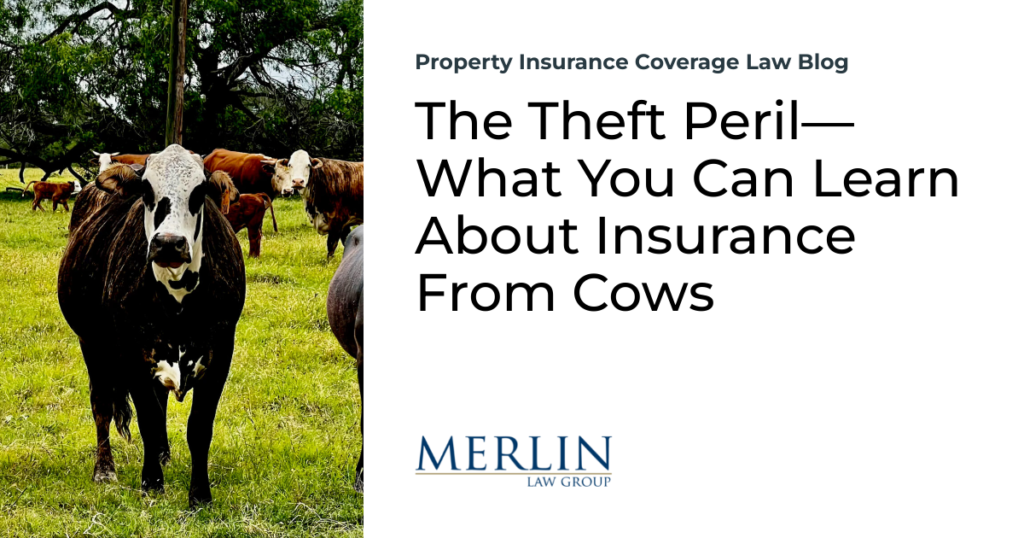The Theft Peril—What You Can Learn About Insurance From Cows

My herd is growing! Donice Krueger had a surprise birthday present for me three years ago: A grand champion cow her ranch foreperson’s grandson raised by hand was bought at auction by Donice for my birthday present. I named her Katy Perry, after my favorite singer. Katy had a calf I named Daisy a year ago. A couple of weeks ago, Orlando was born. My Texas buddies know that I am NOT an “all hat, but no cattle type of guy.”
The theft of cattle is not new. Branding and marking of cattle has existed for centuries to help prevent theft. What happens if a cow is not physically stolen without knowledge of the owner but given to a scheming con artist who took the animal? Can the cattle owner claim the cow was stolen and the loss covered as “theft?”
The Supreme Court of Wisconsin was presented with this issue after a lower Wisconsin appellate court found that coverage applied under the rancher’s policy. The Wisconsin Supreme Court found that a “theft” occurred, but that coverage did not apply with the following reasoning:1
The insurance policy insures “against direct loss to the property covered.” The direct loss which Katze sustained was not of the cattle that he sold and delivered to Laeseke, but rather of the money that Laeseke had promised to pay him for the cattle. To hold otherwise would in effect hold that the policy insures the consideration in business transactions or that Katze was insured against a lack of prudence in making a bad bargain. It is not reasonable nor would a reasonable insured contemplate that the theft coverage provided by this farmowner’s policy extended to the very substantial credit and business loss risks so obviously inherent in Katze’s $800,000 per year livestock dealer operations.
A reasonable insured would not have assumed that the policy covered unsuccessful credit transactions in the cattle dealer business. Katze surrendered physical possession of the cattle to Laeseke in the sale on credit, since he was not given any payment on delivery of the first 50 head. Katze could have refused delivery until he had been paid. Instead he relied on payment subsequent to delivery and therefore extended credit even though it was for a short duration. Theft took place due to Laeseke’s fraudulent intent under the wording of the policy; however, what Laeseke directly stole from Katze was the sale value of the cattle. Laeseke directly stole money due Katze for the cattle. We find the reasonable analysis is that the money not received for the unrecovered cattle was his direct loss. Katze surrendered the cattle in exchange for the commercial paper, the NSF check, and therefore the direct loss he sustained was the money represented by the check and not the cattle. But for the bad commercial deal occasioned by Laeseke’s fraud, Katze had no intention of maintaining or retaining any proprietary interest in the cattle. Katze transferred the cattle to Laeseke and expected money in return so that his direct loss in the transaction was money.
We therefore hold the fraudulent transfer was a theft under the ambiguous terms of the insurance policy; however, the direct loss to the farmer, Katze, was money, not cattle, as a result of a poor commercial transaction.
The decision of the court of appeals is reversed.
One of the justices disagreed and indicated he would have followed the prior decision, which found coverage.2
Theft of property inherently causes a loss of value in money which the property insurance policy covers. While I understand the court’s reasoning, it would seem that the insurer should have been required to prove the loss was excluded under the policy terms once the court concluded that a “theft” occurred under the policy terms rather than to come to this strained interpretation.
Thought For The Day
I don’t like looking back. I’m always constantly looking forward. I’m not the one to sort of sit and cry over spilt milk. I’m too busy looking for the next cow.
—Gordon Ramsay
1 Katze v. Randolph & Scott Mut. Fire Ins. Co., 116 Wis.2d 206, 341 N.W.2d 689 (Wis. 1984).
2 Id. at 216.







